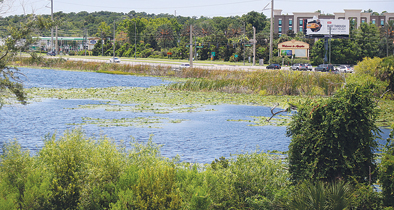
File photo
Key Points

The Apopka City Council voted 4-0 to grant staff authority to negotiate an agreement with Lumen Technologies to install a temporary pump station to drain excess water from Border Lake to Blue Lake.
Vice Mayor Diane Velazquez was absent from the Thursday, June 4, meeting, but the other four council members voted in favor of the action.
City attorney Andrew Hand gave the City Council an overview of the Lumen agreement, which allows the city to place a pump station on Lumen Technologies’ property to drain excess water from the chain of lakes in the S.R. 436/Piedmont-Wekiwa Road area.
Lumen Technologies owns an office building located next to Lake Border Drive in Apopka.
The main changes in the agreement include increasing the nominal consideration, setting a 365-day deadline for project completion, and adding indemnification language.
“This is a temporary access and construction easement agreement, so it would only be in existence while the temporary project is going on,” Hand told the Council. “This is a very simple agreement. Shouldn’t be anything complex.”
After debating the agreement’s urgency due to the start of the Atlantic hurricane season – which began June 1 and ends on Nov. 30 – and the need for consistent legal procedures, the City Council agreed to authorize Hand to negotiate agreement with Lumen.
The agreement includes a change in the nominal consideration from $10 to $500, which is an amount that is not mandatory to pay but only recited for terms of the contract, according to Hand.
“It’s not clear to me whether they actually want $500 … but as long as the city is okay with that amount, no problem there,” Hand said.
The easement termination date is 365 days from the effective date, and any restoration work must be to the city’s satisfaction.
“The modifications just give the city a hard deadline of getting everything done within 365 days with these changes,” Hand said.
Hand suggested that the agreement should have a limit on the indemnification clause to preserve sovereign immunity.
“This is just allowing some flexibility for the city attorney to discuss with their [Lumen] attorney, some limitations, some indemnification that would be acceptable, but essentially, we would just want to make sure that sovereign immunity is preserved and specifically cited and applies to both the contract and tort,” Hand said.
Also, Hand said that Exhibit A of the agreement, which defines the easement area, needs clarification.
During Council discussion, Commissioner Nick Nesta asked if the changes were new to everyone. Mayor Bryan Nelson said that he and City Council members received the agreement “an hour ago.” Interim city administrator Radley Williams said he had not seen the agreement before.
Nesta then raised concerns about what he viewed as inconsistencies in the agreements and the need for a comprehensive review.
Hand explained that the difference between the Lumen agreement and the homeowner agreement was that the Lumen version provides an indemnification provision. Therefore, the document should go before the City Council.
Nesta also questioned whether the city needs to pay the $500 nominal consideration fee.
Blanche Sherman, city finance director, told the City Council that funds are already budgeted for the $500 nominal consideration fee and can be paid “in a day.” Hand said there was no need to anticipate paying the $500 right now.
“I agree with you, but they changed it to $500 for a reason,” Nesta replied to Hand. “There’s a reason they changed it. … We’re signing a contract, and I’d just like clarity on that again, so I can properly speak to the residents on what we’ve agreed to.”
Since 2017, S.R. 436/Piedmont-Wekiwa Road area has faced post-storm flooding, which officials said had worsened over the years. In October 2024, Hurricane Milton caused the area including the Piedmont Plaza parking lot to go underwater.
For weeks afterward, residents in local communities had to face the consequences of the Hurricane Milton flooding and sought solutions, including at Wekiva Village, where a tiger dam had to be installed to prevent the loss of residential units.
The Apopka Chief and The Planter are weekly community newspapers, independently owned and family operated, that have served the greater Apopka area in Central Florida since 1923 and 1965 respectively.
Follow The Apopka Chief on Facebook.
Follow The Apopka Chief on X.
Follow The Apopka Chief on Instagram.
Suggested Articles
No related articles found.



